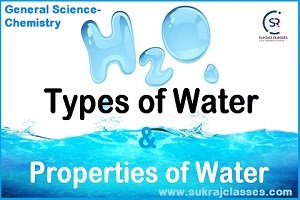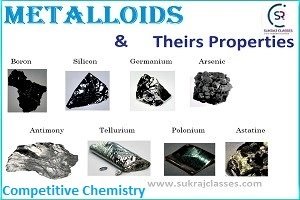
Types of Water and Properties of Water
Competitive Chemistry topic – “Types of Water and Properties of Water”, is important for all competitive exams like CET- Common eligibility Test, SSC CGL, SSC CHSL, RRB NTPC, UPSC and other state civil service exams. In these exams, almost 4-5 Questions are coming from Chemistry.
Types of Water and Properties of Water
Heavy water and its properties:
- Heavy water is a compound that is made up of oxygen and deuterium.
- It is a heavier isotope of hydrogen which is denoted by ‘2H’ or ‘D’.
- Heavy water (D2O), also called deuterium oxide.
- Heavy water composed of deuterium, the hydrogen isotope with a mass double that of ordinary hydrogen, and oxygen.
- The first heavy water plant was set up in India at “Nangal” (Punjab) in 1962.
- Those nuclear reactor in which heavy water is use as “moderator” is called “swimming pool nuclear reactor”.

Uses of Heavy Water:
- Heavy water is used as a moderator in certain types of nuclear reactors.
- It is used in nuclear magnetic resonance spectroscopy.
- It is like to be used in the medical field to test the metabolic rate of human beings.
- In the laboratory heavy water is employed as an isotopic tracer in studies of chemical and biochemical processes.
Royal water and its properties:
- Royal water is also known as name “Aqua regia”.
- Aqua Regia is a mixture of nitric acid and hydrochloric acid, optimally in a molar ratio of 1:3.
- Aqua regia is a yellow-orange (sometimes red) fuming liquid.
- It can dissolve the noble metalse., gold and platinum though not all metals. So, it is called royal water.
- Royal water is used to produce chloroauric acid, the electrolyte used in the gold-refining chemical process.
Poly water and its properties:
- Polywater is prepared in hair like capillary.
- Its boiling point is 150ºC
- Its freezing point is – 40°C (minus 40).
- It is world most dangerous substance.
Water and its Chemical Properties:
Water is a chemical compound consisting of two hydrogen atoms and one oxygen atom. The name water typically refers to the liquid state of the compound. The solid phase is known as ice and the gas phase is called steam.
- Water is known as universal solvent.
- Water is an excellent solvent because of its polarity and high dielectric constant.
- PH of pure water is 7.
- Distilled water and pure water are the bad conductor of electricity.
- If a small amount of acid mixed in pure water/distilled water, they become very good conductor of electricity, due to contain charged ion.
- Water is the main compound found in living organisms.
- Approximately 62 % of the human body is water.
- In its liquid form, water is transparent and nearly colourless.
- Pure water is flavourless and odourless.
- About 71% of the Earth’s surface is covered by water
- Only about 2.5 % of the Earth’s water is freshwater. Nearly all of freshwater (98.8 %) is in Ice and Groundwater.
- Water is the third most abundant molecule in the universe, after Hydrogen gas (H2) and Carbon-monoxide (CO).
- Water displays capillary action because of its strong adhesive and cohesive forces.
- The boiling point of water is 99.98 degrees.
- Water is amphoteric. In other words, it can act as both an acid and as a base.
- Sea water is good conductor of electricity due to the presence of salinity.
Salinity of water:
- The salinity of seawater is defined as the total amount by weight of dissolved salts in one kilogram of seawater.
- Salinity of sea water is 3.5%.
- After drinking of sea water/hard water thirst become increase due to presence of magnesium in this water, which decrease the osmatic pressure of the blood and we feel thirst.
Hardness of water:
There are two types of water hardness:- Temporary and Permanent hardness.
- Temporary Hardness:
Temporary hardness is caused by presence of Magnesium and Calcium-bicarbonate in water is known as temporary hardness.
Temporary hardness Removal method:
-
- By Boiling: This hardness in water can be removed by boiling the water.
- By Clarks Method: It removes the hardness of water by converting bicarbonates into carbonate.
- Permanent Hardness:
When the soluble salts of magnesium and calcium are present in the form of chlorides and sulphides in water, is known as permanent hardness.
-
- This hardness cannot be removed by boiling.
Permanent hardness Removal method:
-
- Permutit or Zeolite is used to remove the permanent hardness of water.
- Treatment with Sodium Carbonate.
Disadvantages of Hardness
-
- Formation of scales on metallic boilers.
- Wastage of soap
- Wastage of fuel
What is BOD:
- Water pollution is measured by the measuring BOD (Biological Oxygen Demand).
- The BOD value describes how clean the water is or the amount of pollution present in it.
- The BOD value describes how clean the water is or the amount of pollution present in it.
- Moderately clean water is 3-5 ppm, whereas somewhat polluted water has a BOD value of 6-9 ppm.
- The BOD value of clean water would be less than or equal to 5 ppm.
Sterilization:
- The process of killing, inactivating, or removing microorganisms (bacteria, viruses, etc.) from a quantity of water.
- Bleaching powder, Chlorine, Potassium-permanganate, Ozone are commonly used in sterilization of water.
Some Important Facts about Water and it’s type:
- Calcium oxide (Lime-stone) is used in colour purification of water.
- By adding “Alum”(फिटकरी) in water, dissolved earthy particle coagulated in the bottom of water tank.
- Solid-bed used in purification of sewage water.
- A white layer formed in water tank due to deposition of calcium and magnesium bicarbonate.
- Hard water does not use in washing cloths and boiler but it can be used in drinking and irrigation.
For More:
If you like and think that General Science (Chemistry) topic on “Types of Water and Properties of Water” was helpful for you, Please comment us. Your comments/suggestions would be greatly appreciated. Thank you to be here. Regards – Team SukRaj Classes.





